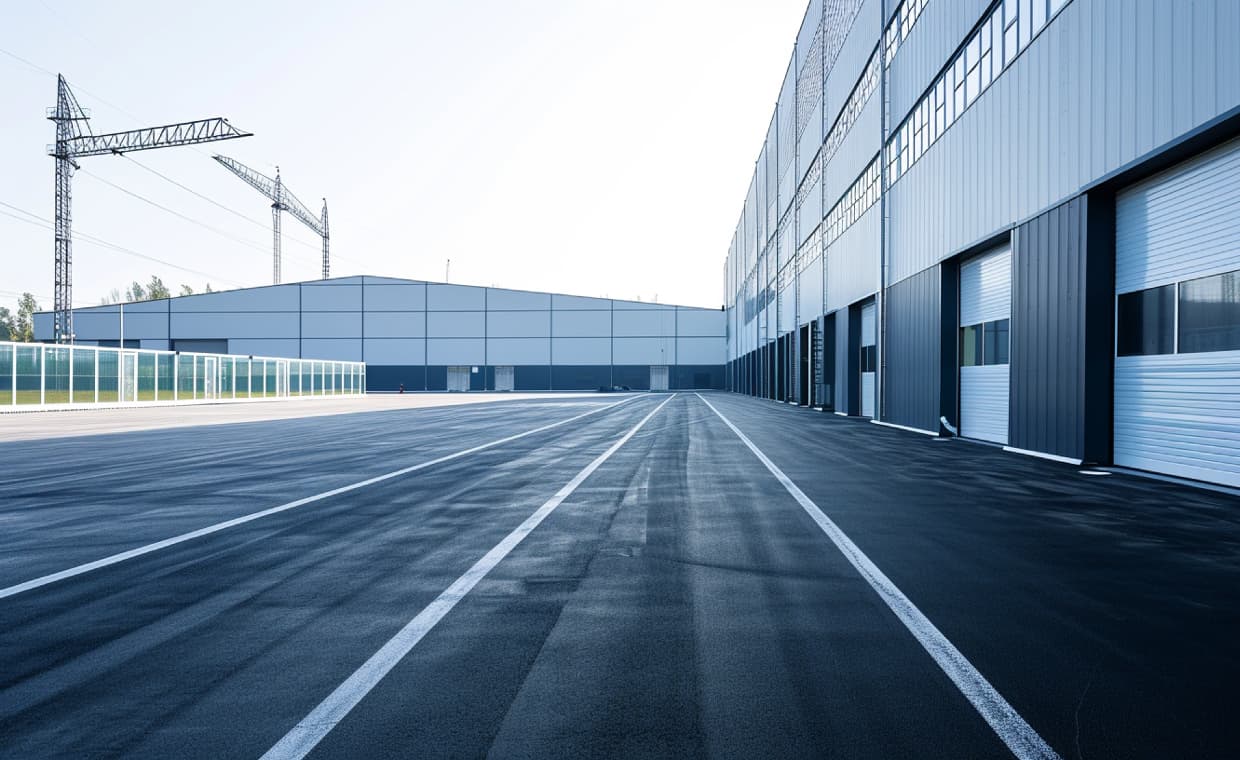
Asphalt, a highly viscous petroleum liquid, serves as a versatile flooring option in various situations. Asphalt flooring comes in different forms, including asphalt mastic, a blend of asphalt and sand in a 2:1 ratio, applied as a flooring layer over a concrete subfloor. Additionally, asphalt tiles are crafted from asphalt fibres, inert ingredients, and mineral colours, offering a range of aesthetic options for diverse flooring needs.
What is Asphalt Flooring?

Asphalt flooring is a smooth coating made of asphalt, chrysotile, paint, and glass beads. It has a flat profile of roughly 1/8 to 3/16 inches, is indestructible, resistant to flames, inexpensive, and easy to work. This flooring is anti-skid, soundproof, and famous because of its water resistance, dirtiness, junction, acid resistance, and appealing appearance. It’s suitable for areas where the temperature on the ground is less than 27 degrees Celsius.
Where are Asphalt Flooring Used?

One can use asphalt flooring in parking lots, flyovers, footbridges, verandas, and other places. It can be placed on an existing concrete base. Opening up patios and footbridges is a good idea. Most countries prefer asphalt flooring because it is durable and sturdy.
Asphalt Flooring Installation and Preparation

- Site Preparation: Clearing the designated area of debris, vegetation, and existing pavement marks the initial phase. Grading the surface is a critical step to facilitate proper water drainage, and prevent issues related to water accumulation. Creating a stable and well-compacted base is paramount, as it forms the foundation upon which the subsequent layers will rest.
- Subbase Installation: Following site preparation, the installation of the subbase involves laying a layer of aggregate material, typically crushed stone, or gravel. This layer serves as the foundation, providing stability and facilitating the even distribution of loads. The thickness of the subbase is determined by the specific requirements of the project, ensuring a solid groundwork for the asphalt.
- Base Course Placement: Once the subbase is in place, you prepare the next layer, known as the base course. This layer consists of a coarser aggregate, which enhances the strength of the pavement. Proper compaction of the base course is crucial for achieving a stable and even surface. The thickness of the base course varies based on the unique demands of the project and the anticipated traffic load.
- Asphalt Mix Design: The composition of the asphalt mix is a pivotal aspect of the installation process. Careful selection of the asphalt binder, aggregates, and additives is necessary to achieve the desired properties. Proportioning the mix is critical for durability, flexibility, and resistance to environmental factors. Ensuring the quality of the asphalt mix is fundamental to the overall performance of the pavement.
- Asphalt Paving: With the base layers prepared, the hot asphalt mix is laid on the surface and compacted using heavy rollers. This step is essential for achieving the desired density and strength of the asphalt pavement. The finishing touches on the surface ensure a smooth and visually appealing appearance.
- Curing and Sealing: Following paving, the asphalt requires time to cure and harden. Keeping the pavement free from traffic during this period is essential. To enhance longevity, a sealant is applied, providing protection against water penetration, and minimising the impact of UV rays. This additional layer of defence reduces the risk of cracks and other forms of deterioration, contributing to the overall durability of the asphalt flooring.
Asphalt Flooring Advantages

- Durability: Asphalt flooring is known for its durability and resilience, making it suitable for high-traffic areas. It can withstand heavy loads and constant foot traffic without easily showing signs of wear and tear.
- Cost-Effective: Asphalt flooring is generally more affordable than some other flooring options, making it a cost-effective choice for both residential and commercial spaces.
- Easy Maintenance: This type of flooring is relatively easy to clean and maintain. Regular sweeping and occasional mopping are usually sufficient to keep it looking clean and well-maintained.
- Water Resistance: Asphalt flooring has inherent water-resistant properties, making it suitable for areas prone to moisture, such as kitchens and bathrooms. It helps prevent water damage and is less susceptible to mould or mildew growth.
- Versatility: Asphalt flooring comes in various styles, colours, and patterns, providing versatility in design options. It can mimic the appearance of other materials like wood or stone, allowing for a wide range of aesthetic choices.
- Comfort Underfoot: Asphalt flooring tends to have a softer and warmer feel compared to some hard flooring materials, providing a more comfortable surface to walk on. This can be particularly beneficial in areas where people spend a lot of time standing.
- Environmentally Friendly: Asphalt is a recyclable material, and some asphalt flooring options incorporate recycled materials. Opting for sustainable asphalt flooring, particularly the use of recycled materials, aligns with eco-friendly and sustainable building practices.
- Sound Insulation: Asphalt flooring has good sound absorption properties, reducing noise levels within a space. This can be advantageous in residential settings or commercial spaces where noise control is important.
- Quick Installation: Asphalt flooring is often quicker to install compared to certain other flooring options. This can result in lower installation costs and less disruption during the installation process.
- Longevity: When properly installed and maintained, asphalt flooring can last longer, providing lasting value for property owners. This longevity contributes to its overall cost-effectiveness.
Asphalt Flooring Disadvantages

- Susceptibility to Stains: Asphalt flooring can be vulnerable to staining, especially if you fail to clean the spills promptly. Certain substances, such as oil or chemicals, may leave permanent stains on the surface.
- Not Ideal for DIY Installation: Proper installation of asphalt flooring requires skill and expertise. It may not be an ideal Do It Yourself (DIY) project. Professional installation may be necessary, adding to the overall cost.
- Vulnerability to Scratches and Dents: While asphalt is durable, it is not impervious to scratches and dents. Sharp objects or heavy furniture dragged across the surface can cause damage over time.
- Limited Aesthetic Options: Although there is some variety in styles and colours, asphalt flooring may have more limited aesthetic options compared to other flooring materials like hardwood or luxury vinyl.
- Prone to Fading: Over time, exposure to sunlight can cause asphalt flooring to fade. This can be a concern in areas with abundant natural light, leading to uneven colouration over the years.
- Potential for Cracking: In extreme temperature variations, asphalt flooring may be prone to cracking. This can occur in regions with significant temperature fluctuations or in areas with poor subfloor conditions.
- Requires Regular Sealing: To maintain its water resistance and overall integrity, asphalt flooring may need periodic sealing. Failure to reseal the surface at appropriate intervals can result in diminished performance and durability.
- Limited Insulation Properties: While asphalt flooring is comfortable underfoot, it may not provide as much insulation against cold temperatures as some other flooring materials. This can be a consideration in colder climates.
- Environmental Concerns: The production and disposal of asphalt materials can have environmental impacts. Asphalt is derived from petroleum, and its production involves energy-intensive processes. Additionally, old asphalt flooring may not be easily recyclable.
- Initial Odour: Asphalt flooring can emit a noticeable odour during the initial installation phase. While this odour typically dissipates over time, it can be a temporary inconvenience for those sensitive to smells.
Conclusion
Asphalt flooring is gaining popularity due to its many desirable characteristics, including its dauntlessness, elasticity, durability, water resistance, acid resistance, and aesthetic appeal. Mastic asphalt flooring is noiseless and non-slippery, making it ideal for use in various settings, including factories, loading platforms, swimming pools, and terraces.
Also, check out these interesting articles on flooring:
6 Top Benefits of Solid Wood Flooring
The Ultimate Guide To Cork Flooring
Author Bio
Sikandar Choudhury – Sikandar Monwar Huda Choudhury is a freelance article writer who is passionate about sharing his knowledge and experience with others through writing. With several years of experience in the engineering field and having written 100+ articles related to construction, Sikandar is a skilled writer with a talent for breaking down complex concepts and making them accessible to a wider audience. Sikandar is always looking for new opportunities to share his knowledge and experience with others through writing and is available for hire as a freelance civil engineering article writer. He is easily reachable on LinkedIn https://www.linkedin.com/in/sikandar-monwar-huda-choudhury-2b3a1a20a/.






























